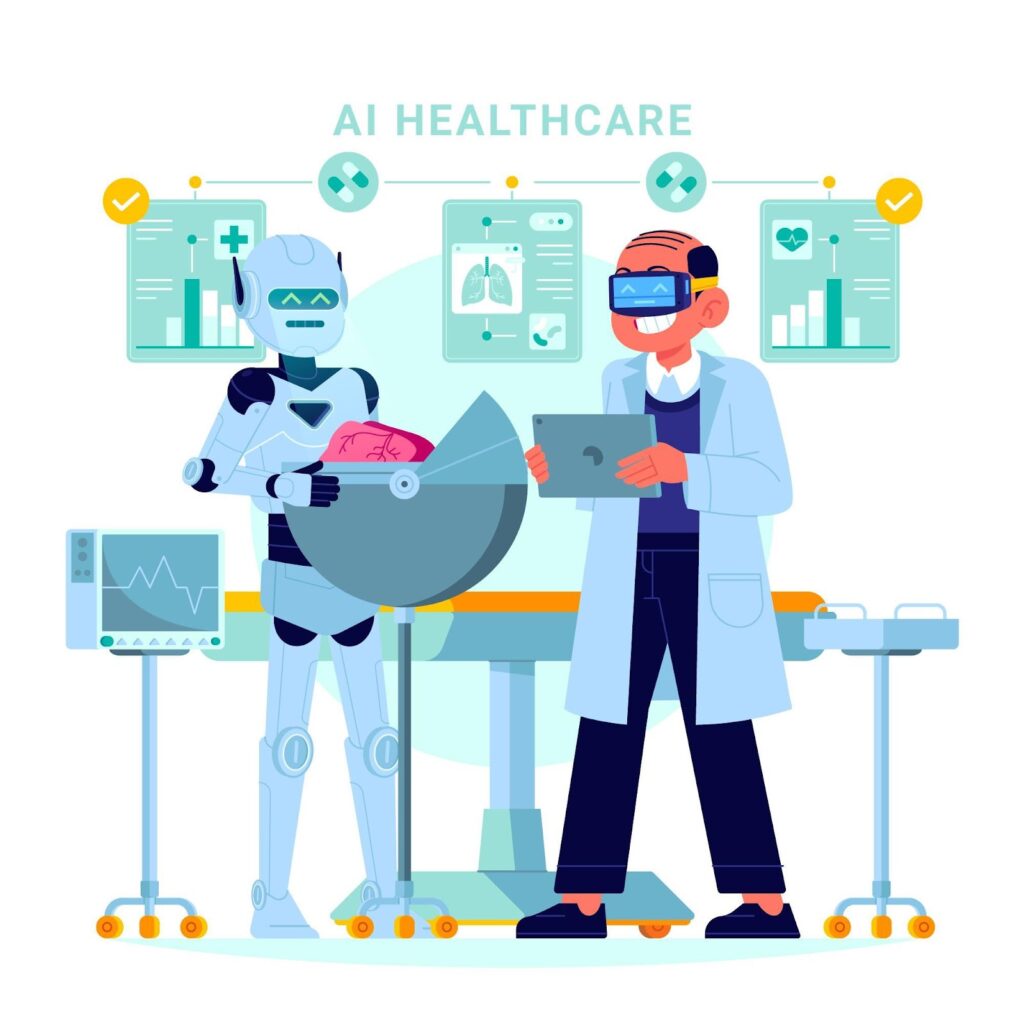The use of AI or artificial intelligence has brought significant changes in several industries, including the healthcare sector. AI has given innovative and efficient solutions towards enhancing customer experience and reducing the cost of operation. Not only the healthcare services observed changes due to AI, but the health insurance segment is constantly noticing enhancement of service and is expected to implement more transformation within the coming days.
Hence, read more to understand the current and future implications of artificial intelligence in health insurance and get an idea of what to expect from this.

Post Contents
Current Implementation of AI in Health Insurance
AI is already deeply ingrained in the health insurance market. Insurers are using artificial intelligence to improve fraud detection and assessment, optimise operations, and improve customer experience as a whole. Here are some points to clearly understand how AI is currently impacting the health insurance sector.
- Personalised Experience for Members: The use of deep data analysis with the help of AI helps provide members with a complete picture of the insurance. It enables more personalised plans, experience and communication, by suggesting benefits to promote wellness and healthy behaviours. Moreover, the processes of AI also enhance customer experience by providing better care and expediting prior authorisation.
- Processing of Claims: The algorithms of AI examine and process claims for health insurance accurately and quickly, thus reducing the settlement time of insurance claims. This process not only helps in detecting fraud but also improves the satisfaction of the borrowers. It is also considered a practical influence towards limiting the amount of prompt pay liability and enhancement of auto-adjudication among insurance providers and payers.
- Enhanced Underwriting: With the ability of AI to analyse large healthcare information and anticipate risks and calculate premiums more precisely, underwriting is being revolutionised each day. Furthermore, by estimating the possibility of claims, insurers can modify premiums. This accuracy helps businesses increase profitability and provide competitive rates, especially in the health and life insurance markets.
- Personalised Risk Assessment: AI algorithms examine large amounts of data to determine risks and modify rates. It is used by insurers to assess risks according to factors including age, location, employment, and way of life. This technology also provides customised risk assessments, evaluating lifestyle, driving patterns, and health to provide suggestions that are specific to each individual, thus increasing consumer happiness and loyalty.
Future Prospects of AI in Health Insurance
The potential of artificial intelligence (AI) in the health insurance industry tends to go beyond what we are experiencing today. Below we have highlighted a few points that give you an idea about AI’s future prospects in this sector.
- Chatbots for Personalised Insurance Guidance: Conversational AI chatbots provide insurance clients with individualised support. Imagine an AI assistant that makes complex insurance plans easier to comprehend, offers recommendations for preventative healthcare based on individual health data, and assists with the claims submission procedure.
- Fraud Detection and Prevention: The use of artificial intelligence has great promise in detecting and preventing false claims. It has the ability to quickly notify insurers of dubious activity by analysing historical data and identifying trends linked to fraudulent behaviour. Sincere customers will be protected by this real-time identification, which can save insurance firms a substantial amount of money.
- Disease Prediction and Prevention: AI, in the future, will be able to examine lifestyle data and medical records to predict the likelihood of developing health issues and diseases. This shall allow the insurance providers to encourage preventive measures and offer targeted health programs, thus significantly reducing the cost of healthcare.
- Personalised Risk Assessment and Dynamic Premiums: There is a lot of data, such as medical records, lifestyle choices, etc. that AI can examine to create a personalised risk profile for every health policyholder. Moreover, it allows insurance companies to offer premiums that reflect the course of an individual’s health, rewarding a better lifestyle and habits.
Challenges and Ethical Consideration of Imposing AI in Health Insurance
Even though the use of AI in the health insurance industry may seem exciting and reduce your workload, there are a few challenges that you might have to face during its usage. Here are some ethical considerations for such use and challenges to face using artificial intelligence in the health insurance sector.
- Ensuring the quality along with the availability of data to accomplish the parameters of consistency and accuracy is a difficult task. This hinders its effectiveness.
- Complying with regulations like GDPR and HIPAA to guarantee the protection of sensitive data is an obstacle resulting in the rise of vulnerabilities.
- Resistance among the employees to change due to the lack of adequate knowledge in adapting to AI operations.
- The implementation of AI requires insurance organisations to make a good amount of investment.
- Insurance companies often lack the infrastructure to make the best use of AI in terms of digital infrastructure and human resources.
- Deficiency of a concrete plan is seen, as quite a few organisations are shifting to AI through competitor influence, leading to inaccurate decision-making.
Bottom Line
Overall, the integration of artificial intelligence in the health insurance sector is expected to revolutionise the entire industry along with providing significant benefits to the borrower and the insurance provider. As AI tend to advance with time, health insurers need to balance ethical considerations and innovations towards effective policy planning. The health insurance sector may look forward to a time when technology enables people to live healthier lives and insurers to offer better, more equal coverage by adopting AI responsibly.